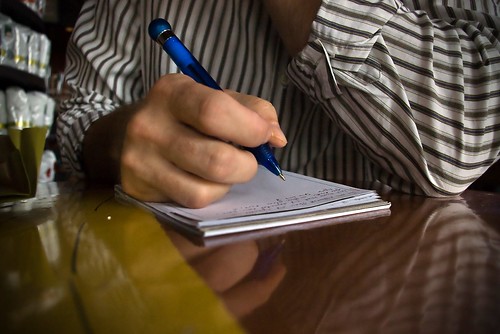This post marks the beginning of an irregular series of blog entries about the other things cooking can do for us. I hope to convince more people to cook. I've learned a lot by cooking: about food, the environment, and myself.
I often think about transferable skills. It's probably a holdover from my days as a professional resume writer. I had to wrangle people's previous work history into transferable skills they could use to get hired in a new career. So it is with cooking. I think cooking can teach us a lot. It can teach us about health and living well. It can connect us to the land and to our families and friends. And it can teach us about time, productivity and clutter.
When I was in college, my apartment was never cleaner than during finals week. I used to think it was procrastination, plain and simple. After reading Michael Ruhlman's Making of a Chef, I'm not so sure.
Chen was behind in his prep; his mise en place was everywhere but en place and his station was a litter of kale and spinach scraps and shallot cores and burnt paper towel that he'd been using to light burners. It was easy for this to happen. When you were swamped, you could not rationalize spending time to clean up what just going to become a mess again.
I think many of us probably feel this way when we're on deadline. In college, it was the paper due, or the upcoming test. Now it's the back-end database or the front-end entry screen or that troublesome piece of .css that must be finished before the site can be delivered to the client. Or it's simply getting dinner on the table. We can't possibly spare the precious minutes it would take to clean, can we?
But Chef Turgeon walked by and said, not for the for the first time, "Chen, you gotta keep your station clean." Turgeon saw that Chen was frustrated and didn't feel he could take the time. Turgeon, knowing Chen had no time to spare, stopped to chat.
Productivity Professional and Internet Comic Merlin Mann wrote about his war against clutter on 43folders. Generally, clutter--physical clutter--in our world bogs us down. It makes it hard to think, hard to achieve the "mind like water" state so often talked about in David Allen's Getting Things Done. By eliminating clutter we free ourselves to work more efficiently. We can work smarter, quicker and are unfettered by the visual blight clutter causes.
At work, my desk can become a mess. Same with my countertop at home. But I never feel better than when I clean it.
"You know in the weeds, in the shits?" Turgeon asked Chen. Chen nodded. "When I was in the weeds, when I was really in the weeds, I'd stop. I'd say, 'Gimme a second.'" Turgeon had looked up at an imaginary expediter and put his hand up like a batter asking the ump for time to step out of the box. Turgeon had an actor's body language. He was on stage; his movements were big, a caricature of what they were meant to portray. "Gimme a second," he said, hand raised, head down toward his station. Then he reached below, pulled a blue Handi Wipe from the sanitation bucket and again, slowly, exaggerating with large round shoulder motions, he wiped down Chen's station, thoroughly and methodically, till it was a clean open field of stainless steel, saying, "And I'd wipe down my station." Somehow he managed to convey service swirling around him, as he ignored it to methodically polish the stainless steel station.
The demo over, Turgeon tossed the wipe into the bucket, stood straight, and said to Chen, " 'Cause when you're in the weeds, this clutter starts to build up." He put his palms on the station and then lifted them slowly to chest level. "And if they cut you open," he said, "that's what your brain would look like."
That's what your brain would look like. Truer words were perhaps never spoken. We can't function with clutter--aural, visual, or mental. When I cook, I also clean. I establish my mise en place, crush the garlic, dice the onions, and while I'm waiting for them to brown, I clean. I wash and rinse the small ramekins I used for oil, onions, garlic. I wipe down the counter and cutting boards. I make sure my surroundings are clean before moving on to the next step. You'd be amazed at the cleaning you can get done while waiting for water to boil.
Cooking--learning to cook has made me more conscious of my surroundings. I have a better understanding of time and being able to use it to its utmost effectiveness. And just as I can't cook well in a cluttered kitchen, I know I can't work well with a cluttered desk, or write well with a cluttered office. So next time you find yourself in the weeds, in the shit, take a second. Wipe down your station. Get rid of the paper piles, coffee cups and Post-Its. Clear out your surroundings. As you do so, you'll also effectively clear out your mind, enabling you to work better, faster. The productivity equivalent of the Six Million-Dollar Man.
And next time you cook? Use those stolen moments to wash a pan, wipe the counter, or toss scraps into the compost container. Getting it done while you cook means you won't be thinking about it while you eat.



